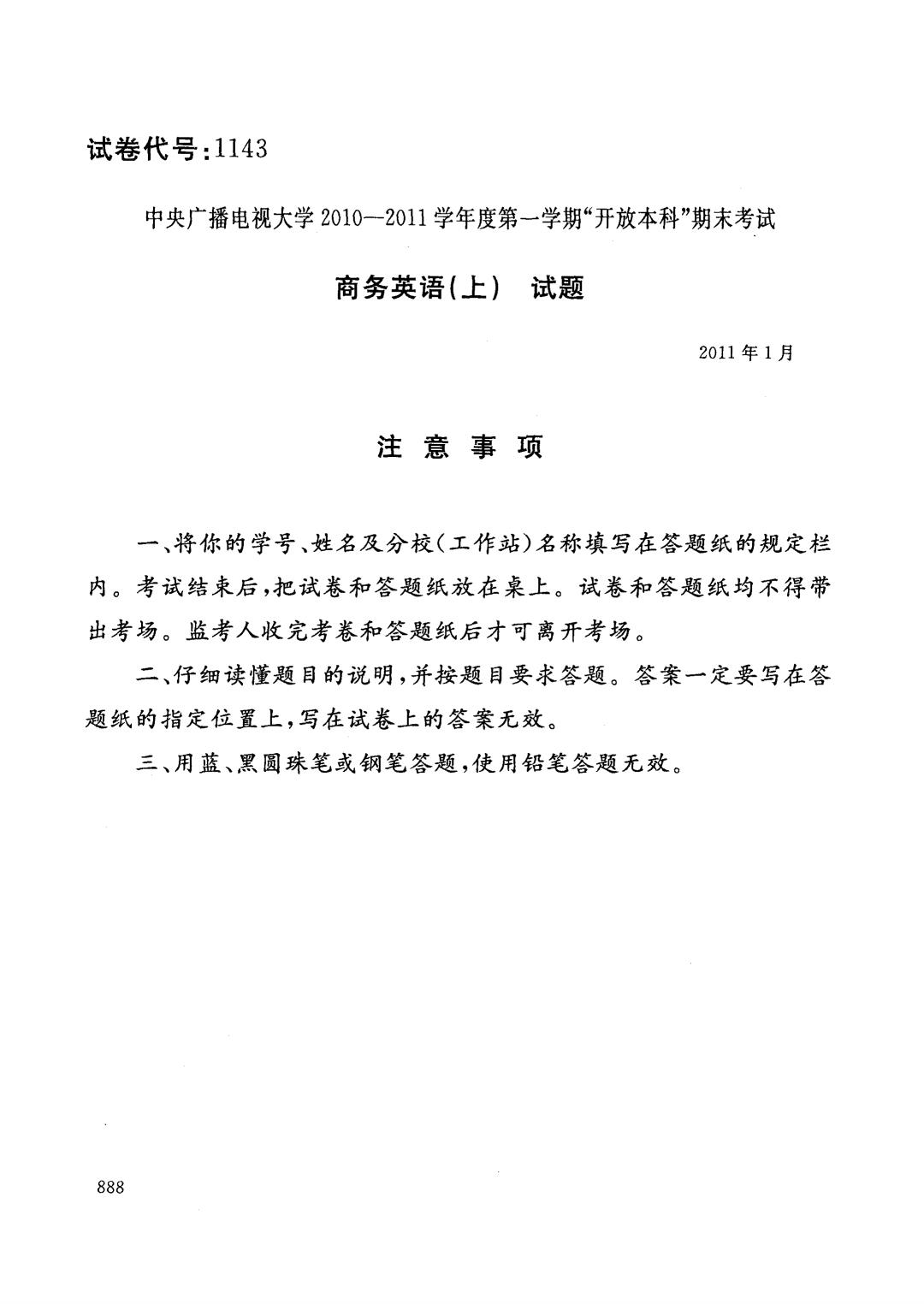
试卷代号:1143 中央广播电视大学2010一2011学年度第一学期“开放本科”期末考试 商务英语(上)试题 2011年1月 注意事项 一、将你的学号、姓名及分校(工作站)名称填写在答题纸的规定栏 内。考试结束后,把试卷和答题纸放在桌上。试卷和答题纸均不得带 出考场。监考人收完考卷和答题纸后才可离开考场。 二、仔细读懂题目的说明,并按题目要求答题。答案一定要写在答 题纸的指定位置上,写在试卷上的答案无效。 三、用蓝、黑圆珠笔或钢笔答题,使用铅笔答题无效。 888
试卷代号 1 1 中央广播电视大学 2011 学年度第一学期 末考 商务英语{上)试题 2011 年1 、将你的学号、姓名及分校(工作站)名称填写在答题纸的规定栏 内。考试结束后,把试卷和答题纸放在桌上。试卷和答题纸均不得带 出考场。监考人收完考卷和答题纸后才可离开考场。 二、仔细读懂题目的说明,并按题目要求答题。答案一定要写在答 题纸的指定位置上,写在试卷上的答案无效。 三、用蓝、黑圆珠笔或钢笔答题,使用铅笔答题无效。 888
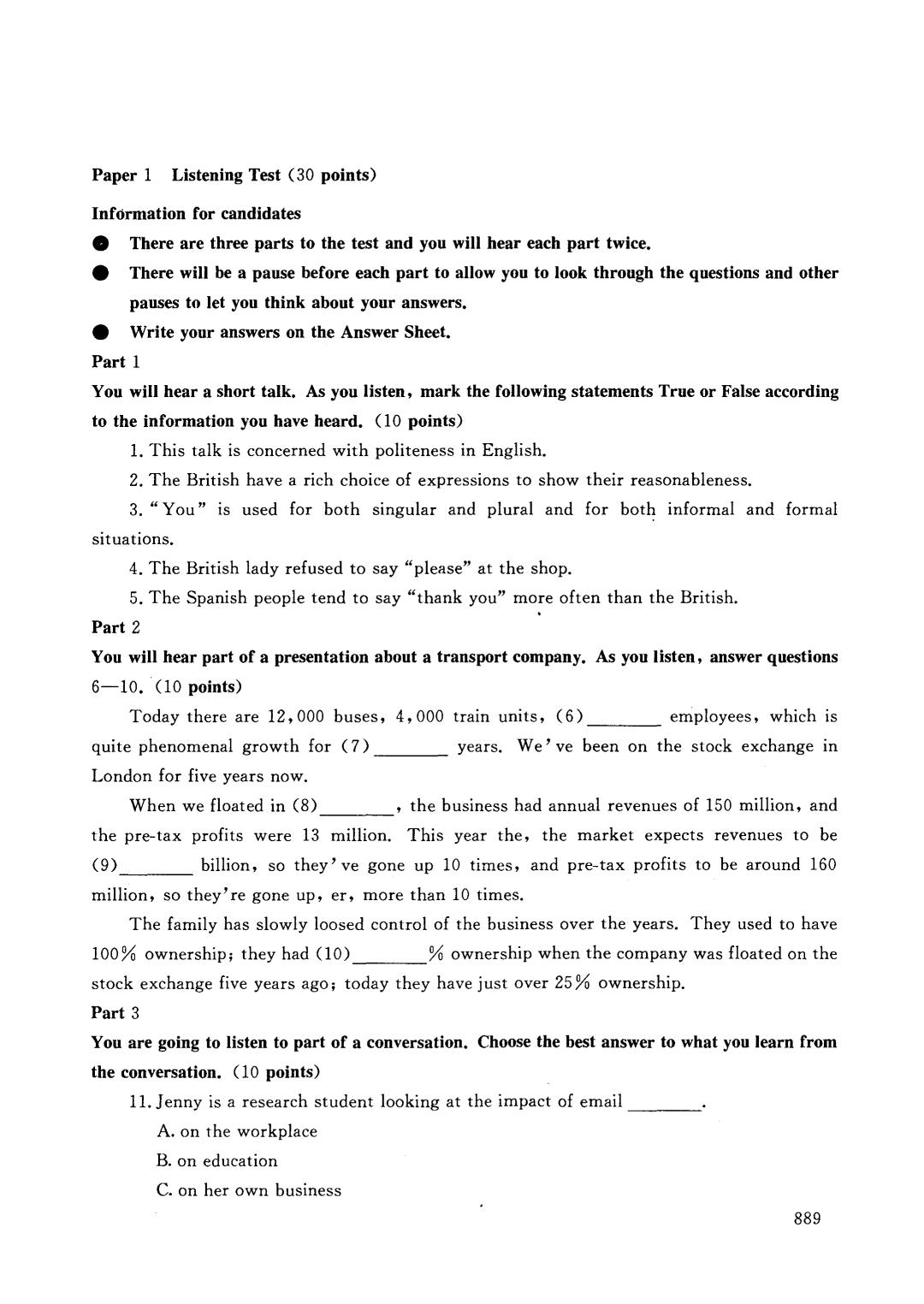
Paper 1 Listening Test (30 points) Information for candidates There are three parts to the test and you will hear each part twice. There will be a pause before each part to allow you to look through the questions and other pauses to let you think about your answers. Write your answers on the Answer Sheet. Part 1 You will hear a short talk.As you listen,mark the following statements True or False according to the information you have heard.(10 points) 1.This talk is concerned with politeness in English. 2.The British have a rich choice of expressions to show their reasonableness. 3."You"is used for both singular and plural and for both informal and formal situations. 4.The British lady refused to say "please"at the shop. 5.The Spanish people tend to say "thank you"more often than the British. Part 2 You will hear part of a presentation about a transport company.As you listen,answer questions 6-10.(10 points) Today there are 12,000 buses,4,000 train units,(6) employees,which is quite phenomenal growth for (7)years.We've been on the stock exchange in London for five years now. When we floated in (8) the business had annual revenues of 150 million,and the pre-tax profits were 13 million.This year the,the market expects revenues to be (9) billion,so they've gone up 10 times,and pre-tax profits to be around 160 million,so they're gone up,er,more than 10 times. The family has slowly loosed control of the business over the years.They used to have 100%ownership;they had (10) %ownership when the company was floated on the stock exchange five years ago;today they have just over 25%ownership. Part 3 You are going to listen to part of a conversation.Choose the best answer to what you learn from the conversation.(10 points) 11.Jenny is a research student looking at the impact of email A.on the workplace B.on education C.on her own business 889
employees, which is the stock exchange in • Paper 1 Listening Test (30 points) Information for candidates • There are three parts to the test and you will hear each part twice. • There will be a pause before each part to allow you to look through the questions and other pauses to let you think about your answers. • Write your answers on the Answer Sheet. Part 1 You will hear a short talk. As you listen , mark the following statements True or False according to the information you have heard. (10 points) 1. This talk is concerned with politeness in English. 2. The British have a rich choice of expressions to show their reasonableness. 3. "You" is used for both singular and plural and for both informal and formal sItuatiOns. 4. The British lady refused to say "please" at the shop. 5. The Spanish people tend to say "thank you" more often than the British. Part 2 You will hear part of a presentation about a transport company. As you listen , answer questions 6-10. (10 points) Today there are 12 ,000 buses, 4 ,000 train units, (6) quite phenomenal growth for (7) years. We' ve been on London for five years now. When we floated in (的, the business had annual revenues of 150 million , and the pre-tax profits were 13 million. This year the , the market expects revenues to be (9) billion , so they' ve gone up 10 times, and pre-tax profits to be around 160 million , so they're gone up , er, more than 10 times. The family has slowly loosed control of the business over the years. They used to have 100% ownership; they had (1 0) % ownership when the company was floated on the stock exchange five years ago; today they have just over 25% ownership. Part 3 You are going to listen to part of a conversation. Choose the best answer to what you learn from the conversation. (10 points) 11. Jenny is a research student looking at the impact of email A. on the workplace B. on education C. on her own business 889
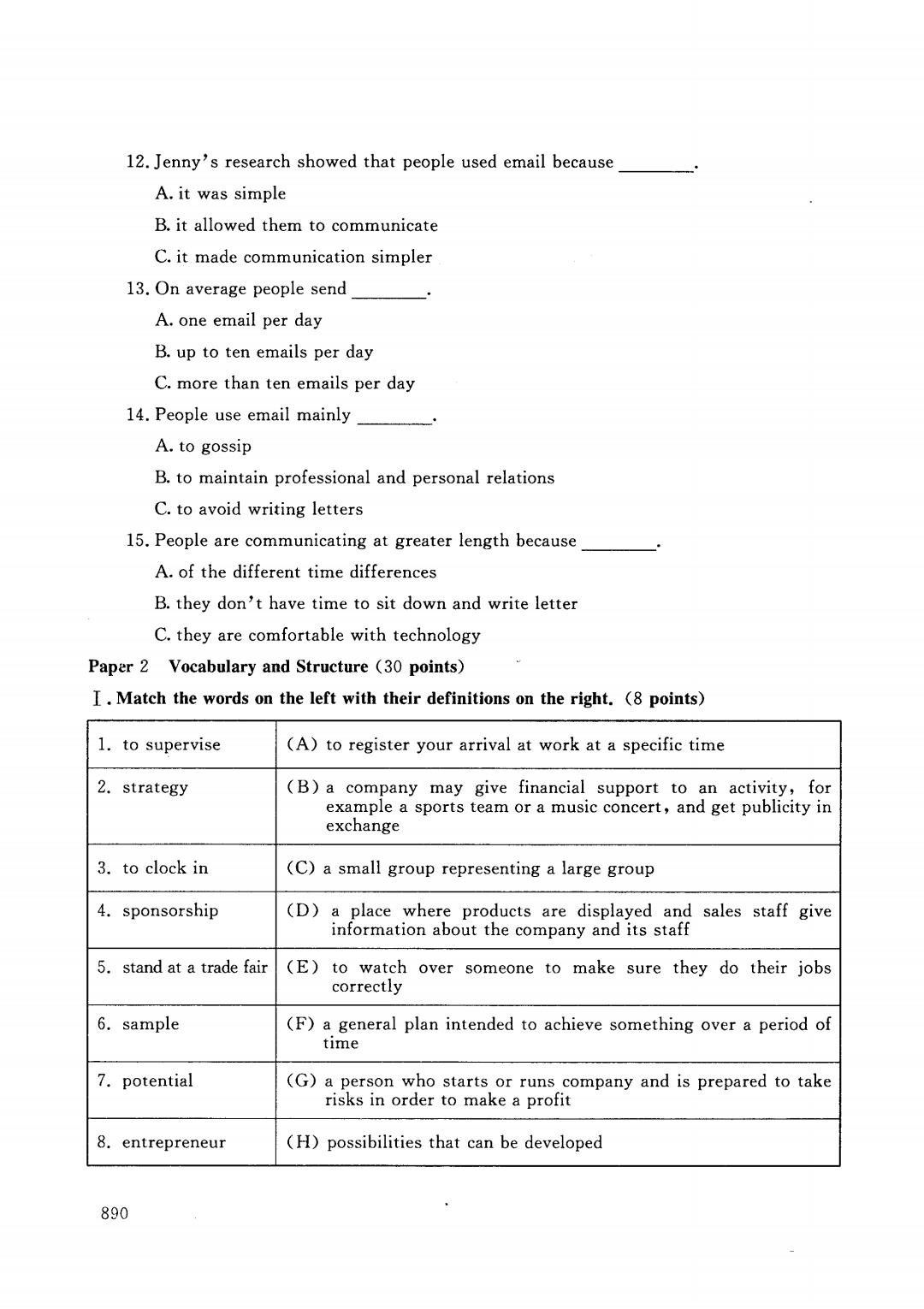
12.Jenny's research showed that people used email because A.it was simple B.it allowed them to communicate C.it made communication simpler 13.On average people send A.one email per day B.up to ten emails per day C.more than ten emails per day 14.People use email mainly A.to gossip B.to maintain professional and personal relations C.to avoid writing letters 15.People are communicating at greater length because A.of the different time differences B.they don't have time to sit down and write letter C.they are comfortable with technology Paper 2 Vocabulary and Structure (30 points) I.Match the words on the left with their definitions on the right.(8 points) 1.to supervise (A)to register your arrival at work at a specific time 2.strategy (B)a company may give financial support to an activity,for example a sports team or a music concert,and get publicity in exchange 3.to clock in (C)a small group representing a large group 4.sponsorship (D)a place where products are displayed and sales staff give information about the company and its staff 5.stand at a trade fair (E)to watch over someone to make sure they do their jobs correctly 6.sample (F)a general plan intended to achieve something over a period of time 7.potential (G)a person who starts or runs company and is prepared to take risks in order to make a profit 8.entrepreneur (H)possibilities that can be developed 890
12. Jenny' s research showed that people used email because A. it was simple B. it allowed them to communicate • • C. it made communication simpler 13. On average people send • A. one email per day B. up to ten emails per day C. more than ten emails per day 14. People use email mainly A. to gossip B. to maintain professional and personal relations c. to avoid writing letters 15. People are communicating at greater length because A. of the different time differences • B. they don't have time to sit down and write letter C. they are comfortable with technology Pap~r 2 Vocabulary and Structure (30 points) I. Match the words on the left with their definitions on the right. (8 points) 1. to supervise (A) to register your arrival at work at a specific time 2. strategy (B) a company may give financial support to an activity , for example a sports team or a music concert , and get publicity in exchange 3. to clock in (C) a small group representing a large group 4. sponsorship (D) a place where products are displayed and sales staff give information about the company and its staff 5. stand at a trade fair (E) to watch over someone to make sure they do their jobs correctly 6. sample (F) a general plan intended to achieve something over a period of • time 7. potential (G) a person who starts or runs company and is prepared to take risks in order to make a profit 8. entrepreneur (H) possibilities that can be developed • 890
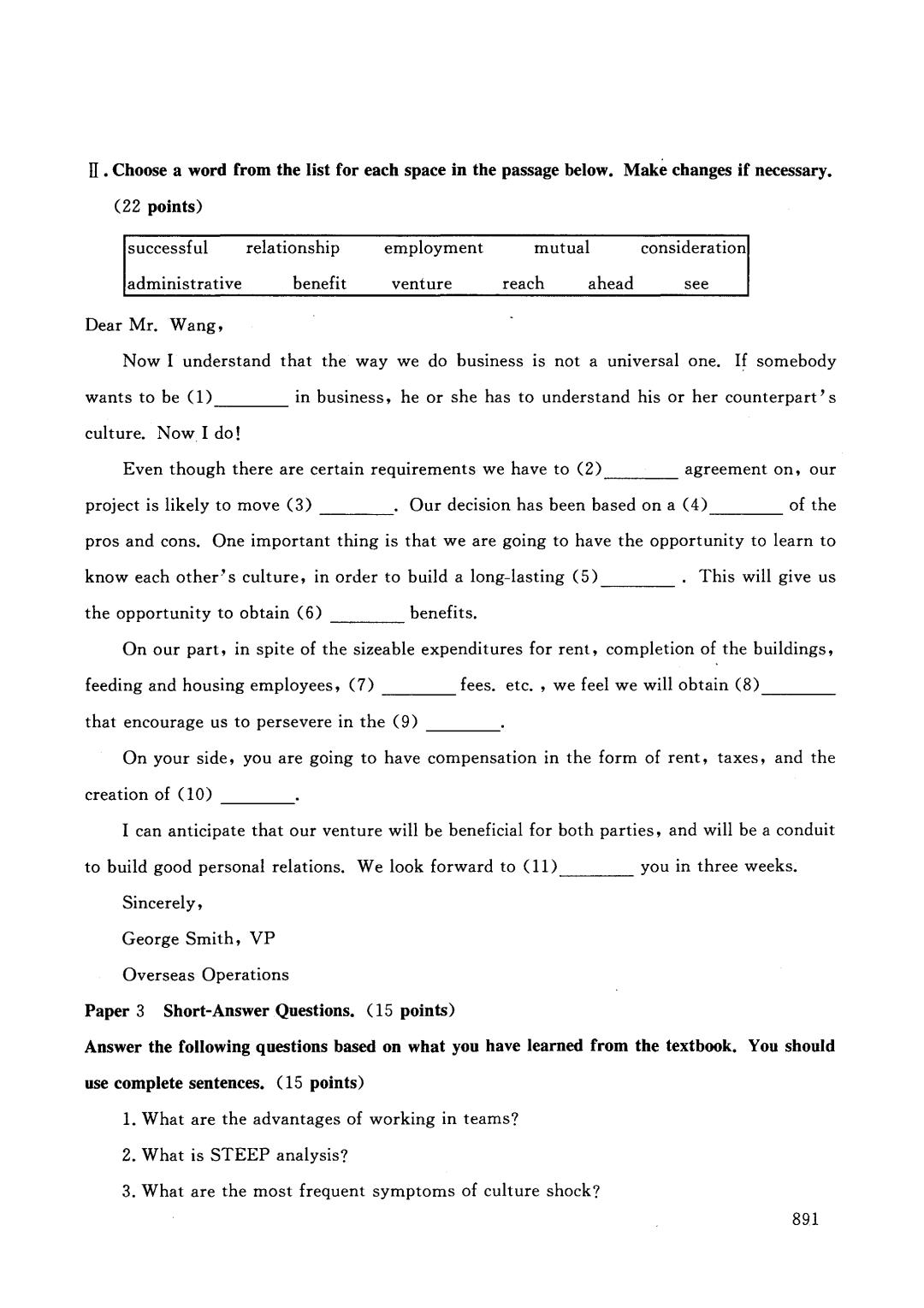
II.Choose a word from the list for each space in the passage below.Make changes if necessary. (22 points) successful relationship employment mutual consideration administrative benefit venture reach ahead see Dear Mr.Wang, Now I understand that the way we do business is not a universal one.If somebody wants to be (1) in business,he or she has to understand his or her counterpart's culture..Now I do! Even though there are certain requirements we have to (2) agreement on,our project is likely to move (3).Our decision has been based on a (4) of the pros and cons.One important thing is that we are going to have the opportunity to learn to know each other's culture,in order to build a long-lasting (5) _·This will give us the opportunity to obtain (6) benefits. On our part,in spite of the sizeable expenditures for rent,completion of the buildings, feeding and housing employees,(7)fees.etc.,we feel we will obtain(8) that encourage us to persevere in the (9) On your side,you are going to have compensation in the form of rent,taxes,and the creation of (10)_. I can anticipate that our venture will be beneficial for both parties,and will be a conduit to build good personal relations.We look forward to (11) you in three weeks. Sincerely, George Smith,VP Overseas Operations Paper 3 Short-Answer Questions.(15 points) Answer the following questions based on what you have learned from the textbook.You should use complete sentences.(15 points) 1.What are the advantages of working in teams? 2.What is STEEP analysis? 3.What are the most frequent symptoms of culture shock? 891
II . Choose a word from the list for each space in the passage below. Make changes if 配ess町y. (22 points) successful relationship employment mutual consideration administrative benefit venture reach ahead see Dear Mr. Wa Now I understand that the way we do business is not a universal one. If somebody wants to be (1) culture. Now I do! in business, he or she has to understand his or her counterpart' s Even though there are certain requirements we have to (2) agreement on , our project is likely to move (3) . Our decision has been based on a (4) of the pros and cons. One important thing is that we are going to have the opportunity to learn to know each other's culture , in order to build a long-lasting (5) . This will give us the opportunity to obtain (6) benefits. On our part, in spite of the sizeable expenditures for rent , completion of the buildings, feeding and housing employees, (7) that encourage us to persevere in the (9) fees. etc. , we feel we will obtain (8) • On your side , you are going to have compensation in the form of rent , taxes, and the creation of (10) • I can anticipate that our venture will be beneficial for both parties, and will be a conduit to build good personal relations. We look forward to (11) Sincerely, George Smith , VP Overseas Operations you in three weeks. Paper 3 Short-Answer Questions. (15 points) Answer the following qu臼tions based on what you have learned from the textbook. You should use complete sentences. (15 points) 1. What are the advantages of working in teams? 2. What is STEEP analysis? 3. What are the most frequent symptoms of culture shock? 891
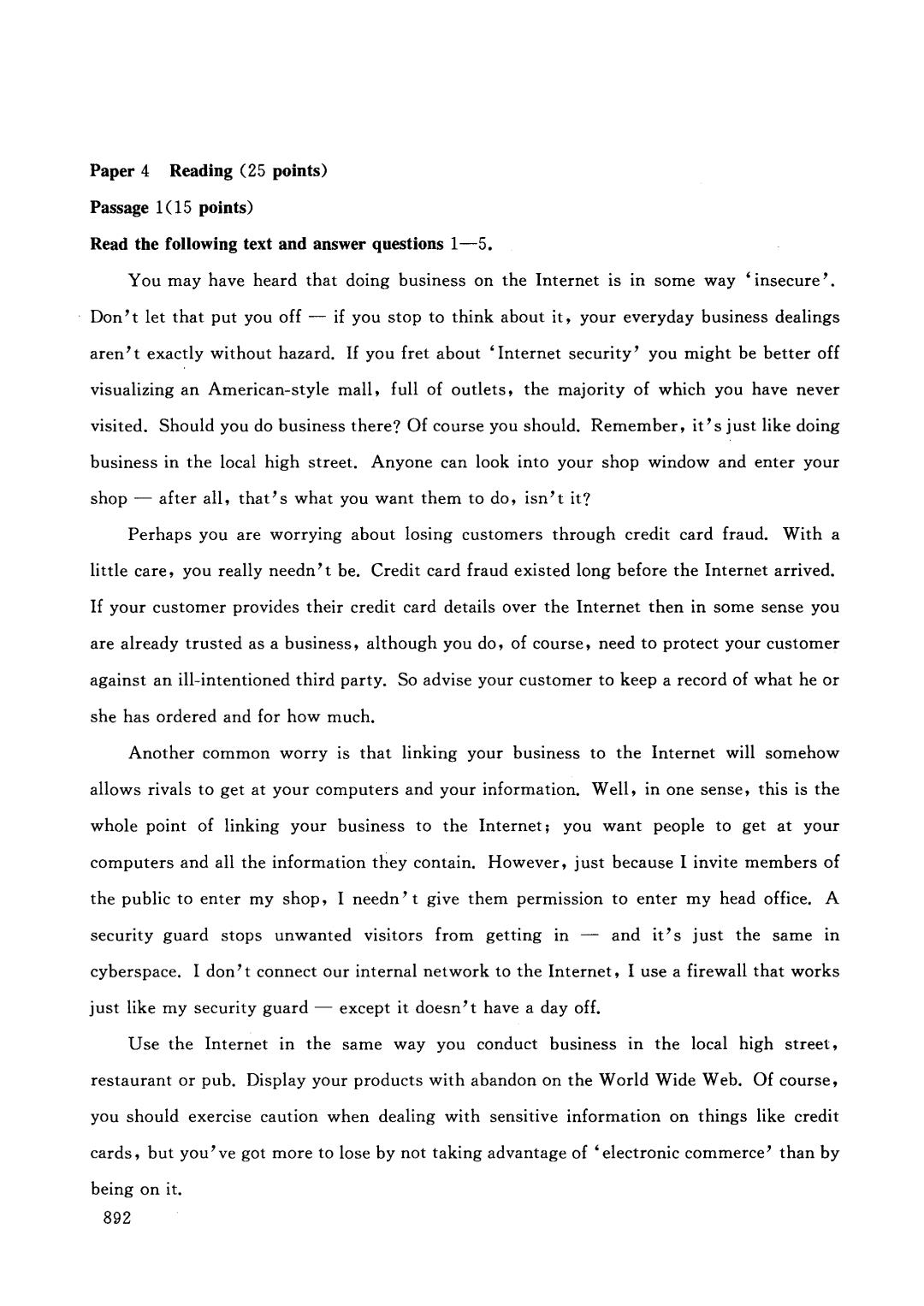
Paper 4 Reading (25 points) Passage 1(15 points) Read the following text and answer questions 1-5. You may have heard that doing business on the Internet is in some way 'insecure'. Don't let that put you off-if you stop to think about it,your everyday business dealings aren't exactly without hazard.If you fret about 'Internet security'you might be better off visualizing an American-style mall,full of outlets,the majority of which you have never visited.Should you do business there?Of course you should.Remember,it's just like doing business in the local high street.Anyone can look into your shop window and enter your shop-after all,that's what you want them to do,isn't it? Perhaps you are worrying about losing customers through credit card fraud.With a little care,you really needn't be.Credit card fraud existed long before the Internet arrived. If your customer provides their credit card details over the Internet then in some sense you are already trusted as a business,although you do,of course,need to protect your customer against an ill-intentioned third party.So advise your customer to keep a record of what he or she has ordered and for how much. Another common worry is that linking your business to the Internet will somehow allows rivals to get at your computers and your information.Well,in one sense,this is the whole point of linking your business to the Internet;you want people to get at your computers and all the information they contain.However,just because I invite members of the public to enter my shop,I needn't give them permission to enter my head office.A security guard stops unwanted visitors from getting in-and it's just the same in cyberspace.I don't connect our internal network to the Internet,I use a firewall that works just like my security guard-except it doesn't have a day off. Use the Internet in the same way you conduct business in the local high street, restaurant or pub.Display your products with abandon on the World Wide Web.Of course, you should exercise caution when dealing with sensitive information on things like credit cards,but you've got more to lose by not taking advantage of 'electronic commerce'than by being on it. 892
Paper 4 Reading (25 points) Passage 1(15 points) Read the following text and answer questions 1-5. You may have heard that doing business on the Internet is in some way ‘ insecure ' . Don't let that put you off 一if you stop to think about it , your everyday business dealings aren' t exactly without hazard. If you fret about ‘ Internet security' you might be better off visualizing an American-style mall , full of outlets, the majority of which you have never visited. Should you do business there? Of course you should. Remember, it's just like doing business in the local high street. Anyone can look into your shop window and enter your shop - after all , that's what you want them to do , isn't it? Perhaps you are worrying about losing customers through credit card fraud. With a little care , you really needn't be. Credit card fraud existed long before the Internet arrived. If your customer provides their credit card details over the Internet then in some sense you are already trusted as a business, although you do , of course , need to protect your customer against an ill-intentioned third party. So advise your customer to keep a record of what he or she has ordered and for how much. Another common worry is that linking your business to the Internet will somehow allows rivals to get at your computers and your information. Well , in one sense , this is the whole point of linking your business to the Internet; you want people to get at your computers and all the information they contain. However, just because I invite members of the public to enter my shop , I needn' t give them permission to enter my head office. A security guard stops unwanted visitors from getting in - and it's just the same in cyberspace. I don' t connect our internal network to the Internet , I use a firewall that works just like my security guard - except it doesn't have a day off. Use the Internet in the same way you conduct business in the local high street , restaurant or pub. Display your products with abandon on the World Wide Web. Of course , you should exercise caution when dealing with sensitive information on things like credit cards, but you' ve got more to lose by not taking advantage of ‘ elect ronic commerce' than by being on it. 892
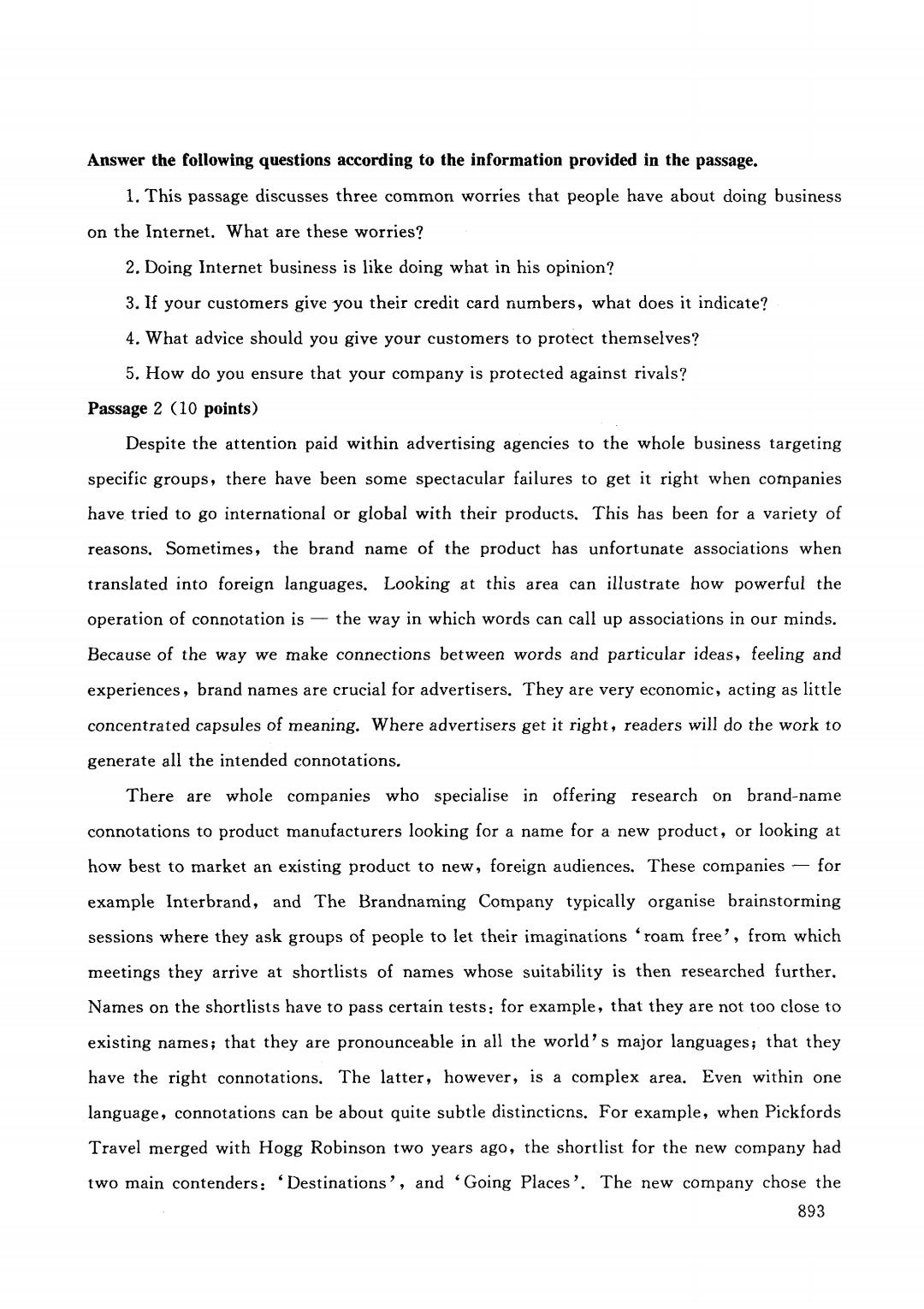
Answer the following questions according to the information provided in the passage. 1.This passage discusses three common worries that people have about doing business on the Internet.What are these worries? 2.Doing Internet business is like doing what in his opinion? 3.If your customers give you their credit card numbers,what does it indicate? 4.What advice should you give your customers to protect themselves? 5.How do you ensure that your company is protected against rivals? Passage 2 (10 points) Despite the attention paid within advertising agencies to the whole business targeting specific groups,there have been some spectacular failures to get it right when companies have tried to go international or global with their products.This has been for a variety of reasons.Sometimes,the brand name of the product has unfortunate associations when translated into foreign languages.Looking at this area can illustrate how powerful the operation of connotation is-the way in which words can call up associations in our minds. Because of the way we make connections between words and particular ideas,feeling and experiences,brand names are crucial for advertisers.They are very economic,acting as little concentrated capsules of meaning.Where advertisers get it right,readers will do the work to generate all the intended connotations. There are whole companies who specialise in offering research on brand-name connotations to product manufacturers looking for a name for a new product,or looking at how best to market an existing product to new,foreign audiences.These companies -for example Interbrand,and The Brandnaming Company typically organise brainstorming sessions where they ask groups of people to let their imaginations 'roam free',from which meetings they arrive at shortlists of names whose suitability is then researched further. Names on the shortlists have to pass certain tests:for example,that they are not too close to existing names;that they are pronounceable in all the world's major languages;that they have the right connotations.The latter,however,is a complex area.Even within one language,connotations can be about quite subtle distincticns.For example,when Pickfords Travel merged with Hogg Robinson two years ago,the shortlist for the new company had two main contenders:'Destinations',and Going Places'.The new company chose the 893
Answer the following questions according to the information provided in the passage. 1. This passage discusses three common worries that people have about doing business on the Internet. What are these worries? 2. Doing Internet business is like doing what in his opinion? 3. If your customers give you their credit card numbers, what does it indicate? 4. What advice should you give your customers to protect themselves? 5. How do you ensure that your company is protected against rivals? Passage 2 (10 points) Despite the attention paid within advertising agencies to the whole business targeting specific groups, there have been some spectacular failures to get it right when companies have tried to go international or global with their products. This has been for a variety of reasons. Sometimes, the brand name of the product has unfortunate associations when translated into foreign languages. Looking at this area can illustrate how powerful the operation of connotation is - the way in which words can call up associations in our minds. Because of the way we make connections between words and particular ideas, feeling and experiences , brand names are crucial for advertisers. They are very economic , acting as little concentrated capsules of meaning. Where advertisers get it right , readers will do the work to generate all the intended connotations. There are whole companies who specialise in offering research on brand-name connotations to product manufacturers looking for a name for a new product , or looking at how best to market an existing product to new, foreign audiences. These companies - for example Interbrand , and The Brandnaming Company typically organise brainstorming sessions where they ask groups of people to let their imaginations ‘ roam free' , from which meetings they arrive at shortlists of names whose suitability is then researched further. Names on the shortlists have to pass certain tests: for example , that they are not too close to existing names; that they are pronounceable in all the world' s major languages; that they have the right connotations. The latter, however, is a complex area. Even within one language , connotations can be about quite subtle distinctions. For example , when Pickfords Travel merged with Hogg Robinson two years ago , the shortlist for the new company had two main contenders: ‘Destinations' , and ‘ Going Places'. The new company chose the 893
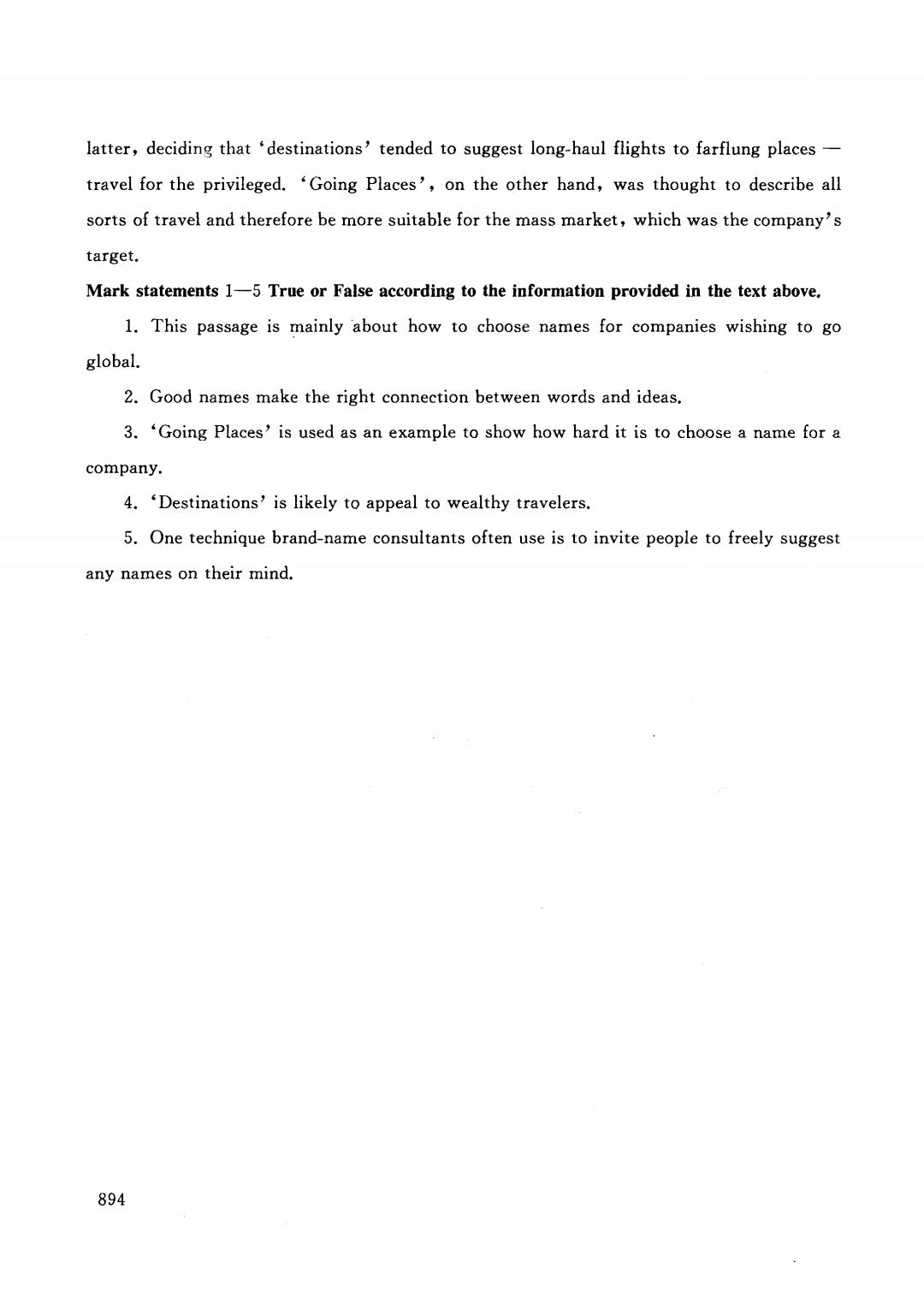
latter,deciding that'destinations'tended to suggest long-haul flights to farflung places- travel for the privileged.'Going Places',on the other hand,was thought to describe all sorts of travel and therefore be more suitable for the mass market,which was the company's target. Mark statements 1-5 True or False according to the information provided in the text above. 1.This passage is mainly about how to choose names for companies wishing to go global. 2.Good names make the right connection between words and ideas. 3.'Going Places'is used as an example to show how hard it is to choose a name for a company. 4.'Destinations'is likely to appeal to wealthy travelers. 5.One technique brand-name consultants often use is to invite people to freely suggest any names on their mind. 894
latter, deciding that ‘ destinations ' tended to suggest long斗laul flights to farflung places - travel for the privileged. ‘Going Places' , on the other hand , was thought to describe all sorts of travel and therefore be more suitable for the mass market , which was the company's target. Mark statements 一5 True or False according to the information provided in the text above. 1. This passage is mainlyabout how to choose names for companies wishing to go globaL 2. Good names make the right connection between words and ideas. 3. ‘Going Places' is used as an example to show how hard it is to choose a name for a company. 4. ‘Destinations' is likely to appeal to wealthy travelers. 5. One technique brand-name consultants often use is to invite people to freely suggest any names on their mind. 894

试卷代号:1143 座位■ 中央广播电视大学2010一2011学年度第一学期“开放本科”期末考试 商务英语(上)试题答题纸 2011年1月 题 号 Paper 1 Paper 2 Paper 3 Paper 4 总 分 分 数 Paper 1 Listening Test (30 points) 得分 评卷人 1. 2. 3. 4. 5. 6. 7. 8. 9. 10. 11. 12. 13. 14. 15. Vocabulary and Structure (30 Paper 2 得分 评卷人 points) I.(8 points) 1. 2. 3. 4. 5 6. 7. 8. Ⅱ.(22 points) 1. 2- 3. 4. 5. 6. 7. 8. 9. 10. 11. 895
试卷代号 1 1 座位号 中央广播电视大学 2011 年度第一学 放本科 末考 商务英语(上)试题答题纸 2011 年1 Paper 1 Paper 2 Paper 3 Paper 4 ,总 Paper 1 Listening Test (30 points) 评卷人 1. 2. 3. 4. 5. 6. 7. 8. 9. 10. 11. 12. 13. 14. 15. Vocabulary and Structure Paper 2 评卷人 points) I. (8 points) 1. 2. 3. 4. 5. 6. 7. 8. II. (22 points) 1. 2. 3. 4. 5. 6. 7. 8. 9. 10. 11. 895
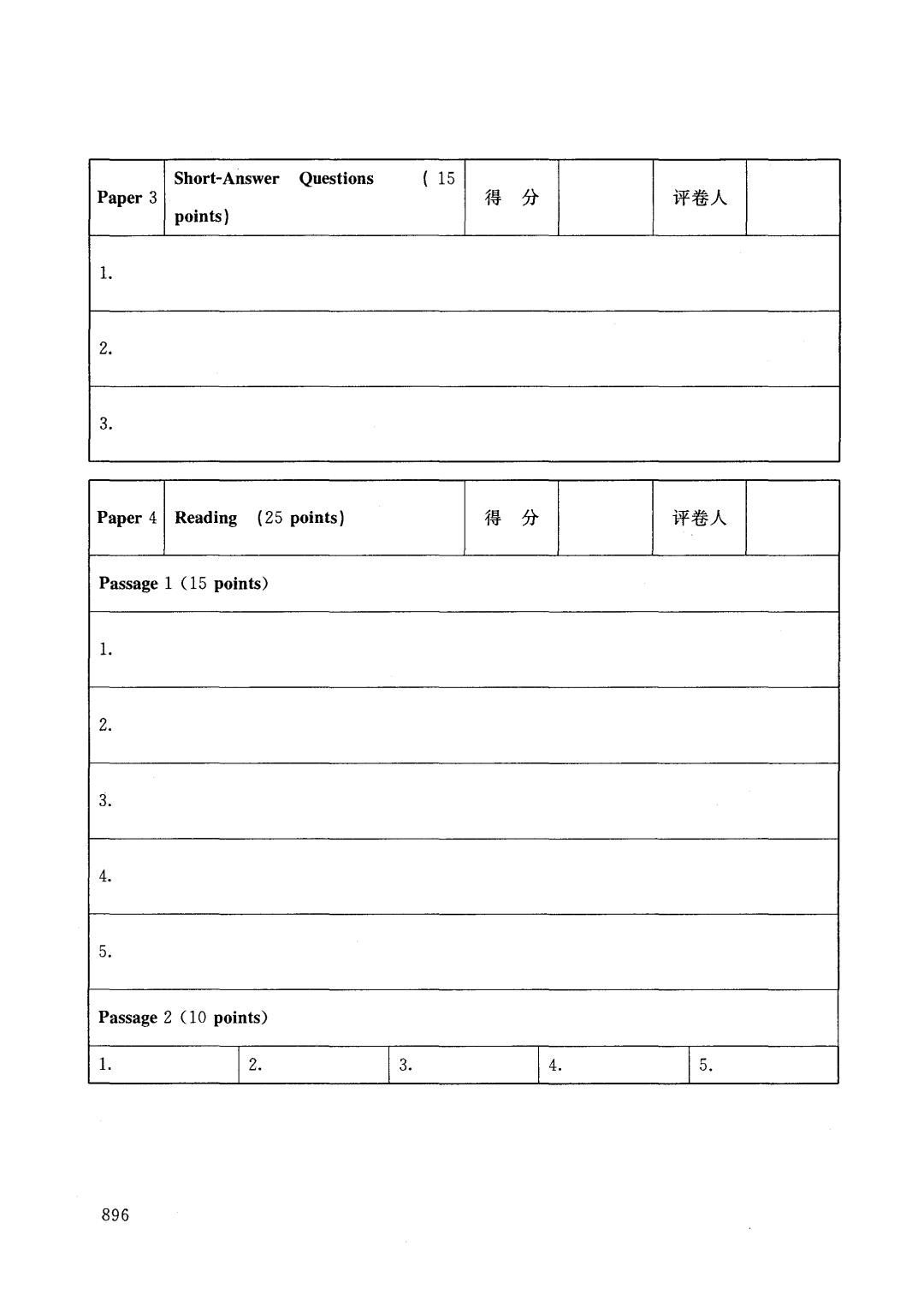
Short-Answer Questions (15 Paper 3 得分 评卷人 points)】 1. 2. 3. Paper 4 Reading (25 points) 得分 评卷人 Passage 1 (15 points) 1. 2. 5. Passage 2 (10 points) y 2. 3. 4. 6 896
Short-Answer Questions Paper 3 评卷人 points) 1. 2. 3. Paper 4 Reading (25 points) 评卷人 Passage 1 (15 points) 1. 2. 3. 4. 5. Passage 2 (10 points) 1. 2. 3. 4. 5. 896

试卷代号:1143 中央广播电视大学2010一2011学年度第一学期“开放本科”期末考试 商务英语(上) 试题答案及评分标准 (供参考) 2011年1月 Paper 1 Listening Test (30 points) Two points for each correct answer. Part 1 You will hear a short talk.As you listen,mark the following statements True or False according to the information you have heard.(10 points) 1.T 2.F 3.T 4.F 5.T Part 2 You will hear part of a presentation about Marks and Spencer.As you listen,answer questions 6-10.(10 points) 6.31,000 7.18 8.1993 9.1.5 10.55 Part 3 You are going to listen to part of a conversation.Choose the best answer to what you learn from the conversation.(10 points) 11.A 12.C 13.B 14.B 15.C Paper 2 Vocabulary and Structure (30 points) I.Match the words on the left with their definitions on the right.(8 points) One point for each correct answer. 1.E 2.F 3.A 4.B 5.D 6.C 7.H 8.G II.Choose a word from the list for each space in the passage below.Make changes if necessary. (22 points) Two points for each correct answer. 1.successful 2.reach 3.ahead 4.consideration 5.relationship 6.mutual 7.administrative 8.benefits 9.venture 10.employment 11.seeing 897
试卷代号 1 1 中央广播电视大学 2011 一学 商务英语(上) Paper 1 Listening Test (30 points) • Two points for each correct answer. Part 1 试题答案及评分标准 (供参考) 2011 年1 You will hear a short talk. As you listen , mark the following statements True or False according to the information you have heard. (10 points) 1. T Part 2 2. F 3. T 4. F 5. T You will hear part of a presentation about Marks and Spencer. As you listen , answer questions 6-10. (10 points) 6. 31 ,000 Part 3 7. 18 8. 1993 9. 1. 5 10. 55 You are going to listen to part of a conversation. Choose the best answer to what you learn from the conversation. (10 points) 11. A 12. C 13. B 14. B 15. C Paper 2 Vocabulary and Structure (30 points) I . Match the words on the left with their definitions on the right. (8 points) • One point for each correct answer. 1. E 6. C 2. F 7. H 3. A 8. G 4. B 5. D II. Choose a word from the list for each space in the passage below. Make changes if necessary. (22 points) • Two points for each correct answer. 1. successful 2. reach 3. ahead 4. consideration 5. relationship 6. mutual 7. administrative 8. benefits 9. venture 10. employment 11. seeing 897